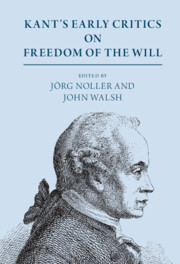Book contents
- Kant’s Early Critics on Freedom of the Will
- Kant’s Early Critics on Freedom of the Will
- Copyright page
- Contents
- Acknowledgements
- Note on the Edition and Translation
- Chronology of the Translated Texts and Kant’s Major Works
- Abbreviations
- Historical and Systematic Introduction
- I Freedom and Determinism
- Hermann Andreas Pistorius, Review of “Elucidations of Professor Kant’s ‘Critique of Pure Reason’ by Joh. Schulze, Royal Prussian Court Chaplain. Königsberg: Dengel, 1784. 8, 254 pages,” 1786
- Johann August Heinrich Ulrich, Eleutheriology or On Freedom and Necessity, Jena, 1788
- Christian Wilhelm Snell, On Determinism and Moral Freedom, Offenbach, 1789
- August Ludwig Christian Heydenreich, On Freedom and Determinism and Their Compatibility, Erlangen, 1793
- II Freedom and Imputability
- III Freedom and Consciousness
- IV Freedom and Skepticism
- V Freedom and Choice
- Appendix: Biographical Sketches
- Glossary
- Notes
- Bibliography
- Index of Persons
- Index of Subjects
Johann August Heinrich Ulrich, Eleutheriology or On Freedom and Necessity, Jena, 1788
from I - Freedom and Determinism
Published online by Cambridge University Press: 24 March 2022
- Kant’s Early Critics on Freedom of the Will
- Kant’s Early Critics on Freedom of the Will
- Copyright page
- Contents
- Acknowledgements
- Note on the Edition and Translation
- Chronology of the Translated Texts and Kant’s Major Works
- Abbreviations
- Historical and Systematic Introduction
- I Freedom and Determinism
- Hermann Andreas Pistorius, Review of “Elucidations of Professor Kant’s ‘Critique of Pure Reason’ by Joh. Schulze, Royal Prussian Court Chaplain. Königsberg: Dengel, 1784. 8, 254 pages,” 1786
- Johann August Heinrich Ulrich, Eleutheriology or On Freedom and Necessity, Jena, 1788
- Christian Wilhelm Snell, On Determinism and Moral Freedom, Offenbach, 1789
- August Ludwig Christian Heydenreich, On Freedom and Determinism and Their Compatibility, Erlangen, 1793
- II Freedom and Imputability
- III Freedom and Consciousness
- IV Freedom and Skepticism
- V Freedom and Choice
- Appendix: Biographical Sketches
- Glossary
- Notes
- Bibliography
- Index of Persons
- Index of Subjects
Summary
In his Eleutheriology or On Freedom and Necessity (1788), Ulrich is concerned with the prospect of the concept of transcendental freedom carving out conceptual space between necessity and chance. He notes the ingenuity of Kant’s restriction of natural necessity to appearances and his attempt to locate freedom in a sphere independent of temporal conditions. However, the denial of natural necessity to things in themselves does not entail that the intelligible character is not necessarily determined in a way independent of temporal conditions. Ulrich presses this issue with respect to those instances in which pure reason does not effectively determine the will, i.e. with respect to immoral action. He asserts that there either is a ground sufficient for the exercise or omission of reason’s efficacy, or not. If there is such a ground, then reason is necessarily determined and Kant is ultimately a determinist even with respect to the intelligible character. If there is not, then whether we act morally or immorally is the result of chance, which is irrational.
- Type
- Chapter
- Information
- Kant's Early Critics on Freedom of the Will , pp. 9 - 23Publisher: Cambridge University PressPrint publication year: 2022

